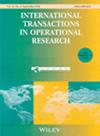Robust optimization model for relief supplies distribution considering fairness
IF 3.1
4区 管理学
Q2 MANAGEMENT
引用次数: 0
Abstract
The emergency management agency (EMA) needs to distribute limited relief supplies efficiently. However, it is difficult to develop a reliable system for relief supplies distribution owing to the uncertainties in emergencies. This paper investigates a robust multiperiod relief supplies distribution problem that considers the uncertainties of transportation time, the amount of donation amount, and the secondary disasters. First, a satisfaction model is constructed by considering the relief supplies and the transportation time. The negative effect of the delay in transportation time is considered in the satisfaction model. Second, based on the satisfaction model, a comprehensive fairness strategy is constructed that considers both vertical fairness and horizontal fairness. Finally, a relief supplies distribution model is built for the EMA that considers the actions of the non‐governmental organization (NGO) and donors. Both the utility and the fairness are considered in the objective of the proposed model. In numerical experiments, the Wenchuan earthquake is conducted to illustrate the applicability of the model and provide implications for decision‐makers. The results show the benefits of considering both vertical fairness and horizontal fairness. Then the suitable threshold is given by the analysis of the time delay. Finally, managerial insights and recommendations for the EMA and the NGO derived from the numerical experiments are presented. The findings in this paper help improve the reliability of the relief supplies distribution system.考虑公平性的救灾物资分配鲁棒优化模型
应急管理机构(EMA)需要有效地分发有限的救援物资。然而,由于紧急情况下的不确定性,很难开发出可靠的救援物资分配系统。本文研究了一个稳健的多周期救援物资分配问题,该问题考虑了运输时间、捐赠金额和次生灾害等不确定性因素。首先,通过考虑救灾物资和运输时间构建了一个满意度模型。满意度模型考虑了运输时间延迟的负面影响。其次,在满意度模型的基础上,考虑纵向公平和横向公平,构建综合公平策略。最后,为 EMA 建立了一个救灾物资分配模型,该模型考虑了非政府组织(NGO)和捐助者的行动。该模型的目标同时考虑了效用和公平性。在数值实验中,通过汶川地震来说明模型的适用性,并为决策者提供启示。结果显示了同时考虑纵向公平性和横向公平性的好处。然后,通过对时间延迟的分析,给出了合适的阈值。最后,本文介绍了从数值实验中得出的对 EMA 和非政府组织的管理启示和建议。本文的研究结果有助于提高救援物资分发系统的可靠性。
本文章由计算机程序翻译,如有差异,请以英文原文为准。
求助全文
约1分钟内获得全文
求助全文
来源期刊

International Transactions in Operational Research
OPERATIONS RESEARCH & MANAGEMENT SCIENCE-
CiteScore
7.80
自引率
12.90%
发文量
146
审稿时长
>12 weeks
期刊介绍:
International Transactions in Operational Research (ITOR) aims to advance the understanding and practice of Operational Research (OR) and Management Science internationally. Its scope includes:
International problems, such as those of fisheries management, environmental issues, and global competitiveness
International work done by major OR figures
Studies of worldwide interest from nations with emerging OR communities
National or regional OR work which has the potential for application in other nations
Technical developments of international interest
Specific organizational examples that can be applied in other countries
National and international presentations of transnational interest
Broadly relevant professional issues, such as those of ethics and practice
Applications relevant to global industries, such as operations management, manufacturing, and logistics.
 求助内容:
求助内容: 应助结果提醒方式:
应助结果提醒方式:


